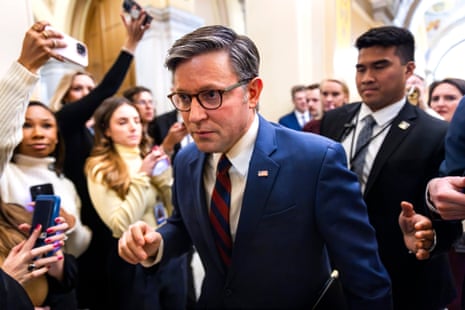Armwood Editorial And Opinion Blog
A collection of opinionated commentaries on culture, politics and religion compiled predominantly from an American viewpoint but tempered by a global vision. My Armwood Opinion Youtube Channel @ YouTube I have a Jazz Blog @ Jazz and a Technology Blog @ Technology. I have a Human Rights Blog @ Law
Sunday, December 14, 2025
Scientists Discuss Epigenetics & Generational Trauma
Saturday, December 13, 2025
SCREAMING Miller KICKED OFF AIR ... Suffers EMOTIONAL BREAKDOWN!
House Republicans propose healthcare plan with no extension of tax credits | House of Representatives | The Guardian
House Republicans propose healthcare plan with no extension of tax credits
"With insurance premiums set to rise sharply for at least 22 million Americans, Mike Johnson unveils alternative

With health insurance premiums set to rise sharply for at least 22 million Americans who purchase their coverage through Affordable Care Act (ACA) marketplaces using tax credits that will expire at the end of this year unless Congress acts, the US House speaker Mike Johnson unveiled a Republican alternative late Friday.
Johnson’s bill comes as his party refuses to extend the enhanced tax subsidies for people who buy policies through the ACA, dubbed Obamacare by opponents of the 2010 law. Those subsidies help lower premiums for Americans who do not get insurance through employers.
Johnson, a Louisiana Republican, huddled behind closed doors to assemble the package for consideration next week as the House focuses the final days of its 2025 work on healthcare.
“House Republicans are tackling the real drivers of health care costs to provide affordable care,” Johnson said in a statement announcing the package.
Time is running out for Congress to act. Democrats engineered the longest federal government shutdown ever this fall in a failed effort to force Republicans to the negotiating table on healthcare. But after promising votes, the Senate failed this week to advance either a Republican healthcare plan or the Democratic bill to extend the tax credits for three years.
Now, with just days to go, Congress is about to wrap up its work with no consensus solution in sight.
The House Republicans offered a 100-plus-page package that focuses on long-sought Republican proposals to enhance access to employer-sponsored health insurance plans and clamp down on so-called pharmacy benefit managers.
Republicans propose expanding access to what’s referred to as association health plans, which would allow more small businesses and self-employed individuals to band together and purchase health coverage.
Proponents say such plans increase the leverage businesses have to negotiate lower rates. But critics say the plans provide skimpier coverage than what is required under the Affordable Care Act.
The Republicans’ proposal would also require more data from pharmacy benefit managers, or PBMs, as a way to help control drug costs. Critics say PBMs have padded their bottom lines and made it more difficult for independent pharmacists to survive.
Additionally, the Republican plan includes mention of cost-sharing reductions for some lower-income people who rely on Obamacare, but those do not take effect until January 2027.
The emerging package from the House Republicans does not include an extension of an enhanced tax credit for the millions of Americans who get insurance coverage through the ACA marketplace. Put in place in 2021 during the Biden administration, in response to the Covid pandemic, that enhanced subsidy expires 31 December, leaving most families in the program facing more than double their current out-of-pocket premiums and, in some cases, much more.
Donald Trump, speaking at the White House on Friday, said he believes Republicans are going to figure out a better plan than Obamacare – something he has promised for years – but he offered few details beyond his idea for providing Americans with stipends to help buy insurance.
The president had touted his proposal for sending money directly to Americans to help offset the costs of healthcare policies, rather than extending the tax credits. It’s unclear how much money Trump envisions. The Senate Republican proposal that failed to advance would have provided payments to new health savings accounts of $1,000 a year for adult enrollees, or $1,500 for people aged 50 to 64. That amount might not cover the increased premiums some Americans are facing in 2026 for even one month.
It appeared there were no such health savings accounts in the new House Republican plan.
Going Johnson’s route has left vulnerable House Republicans representing key battleground districts in a tough spot.
Frustrated with the delays, a group of more centrist Republican lawmakers is aligning with Democrats to push their own proposals for continuing the tax credits, for now, so that Americans don’t face rising healthcare costs.
They are pursuing several paths for passing a temporary ACA subsidy extension, co-sponsoring a handful of bills. They are also signing onto so-called discharge petitions that could force a floor vote if a majority of the House signs on.
Such petitions are designed to get around the majority’s control and are rarely successful, but this year has proven to be an exception. Lawmakers, for example, were able to use a discharge petition to force a vote on the release of the Jeffrey Epstein files held by the Department of Justice.
One petition, filed by Brian Fitzpatrick, a Pennsylvania Republican, had signatures from 12 Republicans and 12 Democrats as of Friday afternoon. It would force a vote on a bill that includes a two-year subsidy extension and contains provisions designed to combat fraud in the ACA marketplace. There are also restrictions for PBMs, among other things.
Another petition from Josh Gottheimer, a New Jersey Democrat, has 39 signatures and is broadly bipartisan. It is a simpler proposal that would force a vote on a one-year ACA enhanced subsidy extension and would include new income caps limiting who qualifies for the enhanced credit.
Both discharge petitions have enough Republicans’ support that they would likely succeed if Democratic leader Hakeem Jeffries encouraged his caucus to jump on board. So far, he’s not tipping his hand.
“We’re actively reviewing those two discharge petitions and we’ll have more to say about it early next week,” Jeffries said.
Meanwhile, Jeffries is pushing Democrats’ own discharge petition, which has 214 signatures and would provide for a clean three-year subsidy extension. No Republicans have signed onto that one.
And as Republicans made clear in the Senate this week, a three-year extension without changes to the program has no chance of passing their chamber."
House Republicans propose healthcare plan with no extension of tax credits | House of Representatives | The GuardianDeal or no deal? The inside story of the battle for Warner Bros | Donald Trump | The Guardian
Deal or no deal? The inside story of the battle for Warner Bros
"As Paramount, with close ties to the Trump administration, entered the bidding, experts predict any merger will ‘raise red flags’ among regulators

Over the first 10 months of his second presidency, Donald Trump has not hidden his desire to control the US media industry – from encouraging TV networks to fire journalists, comedians and critics he dislikes to pushing regulators to revoke broadcast licences. Now he seems determined to set the terms for one of the biggest media deals in history.
It’s a deal that could have repercussions not just in the US, but across the world, with not just the future of Hollywood at stake but also the landscape of news.
Another American president likely would have politely declined to comment when asked by a reporter about a massive media merger that would require fact-driven oversight and regulatory approval by a purportedly independent-minded branch of their administration.
But when Trump was asked on Sunday about Netflix’s $82.7bn (£61.8bn) deal to acquire the studio and streaming businesses of Warner Bros Discovery – the media company whose assets run the gamut from Batman and Casablanca to The Sopranos, Succession and CNN – he didn’t hesitate to say he would be “involved” in the review process for the deal.
Days later a media conglomerate with close ties to his administration, Paramount Skydance, the company behind the Paramount Pictures movie studios, CBS US TV network and Channel 5 in the UK, countered with a hostile $108bn offer for the company.
Trump then offered a contrasting commentary on his role.
“I’m not involved in that,” he told reporters on Wednesday, before adding: “I will be probably involved – maybe involved in the decision. It depends. You have some good companies bidding on it.”
Contradicting himself, Trump then laid out a condition for his support of a deal: the company that buys WBD’s studio, HBO and its streaming assets must also acquire its television channels and make big changes at the cable news network he has long despised, CNN.
“I think CNN should be sold, because I think the people that are running CNN right now are either corrupt or incompetent,” he said.

Only Paramount – run and backed by Trump supporters – had bid for the entire company.
This isn’t normal, commentators and former antitrust officials were quick to point out. “It’s not designed to be a system where the president wakes up one morning and decides it. It’s actually supposed to be the opposite of that,” said Columbia University law professor Tim Wu, who served in Joe Biden’s White House from 2021 to 2023 as a special assistant to the president for competition and tech policy.
During the Biden administration, “we followed the old rules, and the old rules suggested that the White House had to stay very far away from mergers,” Wu said – though “the parties always wanted us to get involved”.
“It’s all set up to keep the White House away,” he said. “This White House? Totally different kind of place.”
Phillip Berenbroick, who served as chief counsel for the US Senate’s judiciary subcommittee on antitrust matters, said that while “it’s not surprising that [Trump’s] interested and says so publicly, that is different from how most presidents and how most administrations have treated the antitrust review process. I think he does relish playing the role of deal-maker”.
Paramount’s starring role raises the likelihood of Trump’s involvement, considering the company is backed by his longtime friend and Oracle co-founder Larry Ellison, and run by his Trump-friendly son David, who has talked up the company’s “good” relationship with the administration.
Another factor that may well weigh in Paramount’s favour, as far as Trump is concerned, is the role of his son-in-law Jared Kushner, whose investment company Affinity Partners is an outside funder for the bid – though Trump said earlier this week that he hasn’t talked to him about it.

Senator Elizabeth Warren, of Massachusetts, along with several of her fellow Senate Democrats, has called foul.
“Donald Trump seems to be saying any Warner Bros bidder needs to make a deal with him – and that could involve a donation to his gold-encrusted ballroom, or it could involve getting rid of a news outlet that he doesn’t like or making movies that only flatter him,” she told the Guardian.
“But Donald Trump should not be the ultimate decision maker here. There needs to be a fair and independent review of this deal, and a straightforward application of the strong antitrust laws we already have on the books.”
But despite Trump’s seeming preference, this deal is far from done. Whichever company ultimately wins out for WBD– and WBD has said that it will evaluate Paramount’s proposal and give its shareholders a recommendation within 10 days – the deal will need to be approved by the antitrust division of the justice department, which is run by Gail Slater, a lawyer with a solid reputation around Washington.
Wu emphasised that while the justice department has the most significant role to play, a decision to approve the merger could easily be challenged by a state attorney general or attorneys general, with California – ground zero for the entertainment industry – most likely to take adverse action and potentially hold up the deal.
“Usually people say, ‘Well, it all depends on what Trump thinks.’ But I think it’s actually not that simple,” Wu said, adding, “Trump likes the idea that it all depends on what Trump thinks.”
When asked about the Paramount bid on Monday, Trump played neutral, suggesting that neither Netflix nor Paramount “are particularly great friends of mine” – though a White House official said that he has good relationships with both companies and does not have a position one way or the other.
Trump has acknowledged that he had recently met Ted Sarandos, the co-chief executive of Netflix, calling him “fantastic”, though he said Sarandos made no guarantees to him about the merger.
Trump has said approval of the deal would depend on how much market share Netflix would take on by acquiring WBD, which he said “could be a problem”, considering its existing dominance of the streaming business. “I want to do what’s right,” he said. “It’s so very important to do what’s right.”
Because a merger of WBD with either Paramount or Netflix would probably serve to greatly reduce competition in Hollywood, both deals are “highly dubious in terms of legality”, said Victor Pickard, professor of media policy and political economy at the University of Pennsylvania. “It seems to me that it should be a textbook case of being seen as anti-competitive in defiance of our antitrust laws, but that certainly doesn’t mean it won’t go through.”
Berenbroick, now a senior strategist for the American Economic Liberties Project, predicted that the merger will “raise red flags” for state, federal and global regulators because of the “significant consolidation” that would result. He expressed confidence in the career staffers at the justice department’s antitrust division. “Those people are really professional and good at their jobs,” he said. The department can file a lawsuit to block the deal, as it did – unsuccessfully – in 2017 to stop the merger of AT&T and then-CNN parent company Time Warner.
Trump could hamper the government’s case in a potential lawsuit by making a statement of preference for one bidder or another, creating the perception of a skewed process, industry experts say.
Despite concerns about consolidation, both Netflix and Paramount have argued publicly that their company would have an easier time winning regulatory approval for the deal. And both companies have hired officials with ties to Trumpworld, potentially easing the path to approval. In October, Paramount brought on as chief legal officer Makan Delrahim, who served as head of the department of justice’s antitrust division during the first Trump administration. Not wanting to be outdone, Netflix this past week brought on Virginia Boney Moore, a former special assistant in Trump’s first office of legislative affairs.
But Trump clearly has a closer relationship with the Ellisons, and officials in his White House had previously discussed their preference for Paramount to emerge as the winning bidder for WBD, which formally put itself up for sale in October. In a filing with the US top financial regulator the Securities and Exchange Commission, Paramount said a Netflix acquisition of WBD would come with “with extraordinary regulatory risk” and “a longer timeline to a possible closing” as a result.
During an interview on CNBC on Monday, David Ellison acknowledged having recent conversations with Trump that touched on CNN. (The Guardian first reported in November that Ellison’s father, Larry, had talked with a senior White House official about potentially ousting two anchors the administration views as Trump critics, Erin Burnett and Brianna Keilar.)

When asked whether he thinks Trump would “embrace” Paramount Skydance owning CNN, Ellison responded, “We’ve had great conversations with the president about this … but I don’t want to speak for him in any way, shape or form.”
Pickard said reported conversations between Trump and the Ellisons about potential firings at CNN are “profoundly troubling” and “just absurd for any democratic society worthy of the name”.
“The end goal of all of this is that Trump wants to snuff out any capacity for dissenting views or independent journalism,” he added.
Trump has largely praised the Ellisons for their stewardship of CBS News, which would probably be combined with CNN. Last month, Trump sat for his first interview with 60 Minutes in five years, and called Bari Weiss, the “anti-woke” commentator who is now the network’s newly appointed top editor, a “great person”. On Sunday, David Ellison sat in Trump’s box at the Kennedy Center Honors award ceremony in Washington which the president himself hosted.
However, minutes after Paramount unveiled its bid on Monday he took to social media to slam the company over CBS’s Sunday news magazine show 60 Minutes interview with the retiring congresswoman Marjorie Taylor Greene. “My real problem with the show, however, wasn’t the low IQ traitor, it was that the new ownership of 60 Minutes, Paramount, would allow a show like this to air. THEY ARE NO BETTER THAN THE OLD OWNERSHIP.”
These are just the opening salvoes in a corporate battle that could take months to resolve and will ultimately reshape global media. A veteran of the anti-trust space said it seems likely that Trump could pressure attorney general Pam Bondi to approve a deal of his choosing.
“If the president wants this deal approved and he tells Pam Bondi, ‘I want this deal approved’ … they’ll find a way to approve it,” the veteran said. “But that doesn’t mean that the states can’t come in and fight the deal.”
Deal or no deal? The inside story of the battle for Warner Bros | Donald Trump | The Guardian
Hundreds Quarantined in South Carolina as Measles Outbreak Shows No Sign of Slowing - The New York Times
Hundreds Quarantined in South Carolina as Measles Spreads
"The outbreak shows no signs of slowing, likely because of the affected area’s “lower-than-hoped-for vaccination coverage,” a state health official said.

More than 250 people who were exposed to measles, including dozens of unvaccinated school-aged children, are quarantining in South Carolina as the state wrestles to contain an outbreak that has sickened more than 110 people.
The outbreak comes during what has already been one of the worst years for the virus since it was declared eliminated in the United States more than two decades ago.
Cases have been centered in Spartanburg County, along the northern border of the state, and the virus appears to be widely spreading through the community: People have been exposed at a church, a health care building and several schools.
The outbreak, which started in October, shows no signs of slowing, likely because of the county’s “lower-than-hoped-for vaccination coverage,” Dr. Linda Bell, South Carolina’s state epidemiologist, said at a news conference on Wednesday.
In the 2024-25 school year, about 90 percent of students in Spartanburg County had all of the required childhood immunizations, including the measles, mumps and rubella shot. That’s slightly below the national average and below the 95 percent target that experts consider necessary to stem the spread of measles.
Many of the schools with students in quarantine have vaccination rates that dip well below 90 percent, according to state data.
Health officials emphasized that the virus can cause major disruptions even for those who don’t get sick. In South Carolina, some unvaccinated students were exposed to the virus on two separate occasions, leading them to quarantine twice, for 21 days each.
“That’s a significant amount of time,” Dr. Bell said. “Vaccination continues to be the best way to prevent the disruption that measles is causing to people’s education, to employment.”
State officials have ramped up M.M.R. vaccination efforts, though it’s unclear whether they have made a meaningful impact. There has been “limited uptake in the affected community,” said Andrew Nixon, a spokesman for the Department of Health and Human Services. He added that vaccination was “the best way to protect against measles” and encouraged people to talk with a doctor about “what is best for them.”
It appears to be the third major measles outbreak in the country this year. The first started along the western edge of Texas in January and spread to neighboring Oklahoma and New Mexico, ultimately becoming the single largest outbreak of measles in decades.
In August, another multistate outbreak erupted at the Utah-Arizona border, where health officials have reported dozens of new cases in the states in the last three weeks.
Nationally, more than 1,900 measles cases have been reported so far this year, according to data from the Centers for Disease Control and Prevention. Three unvaccinated people, including two children, have died.
Canada has also grappled with large, deadly measles outbreaks this year, leading it to lose its elimination status officially last month.
While measles symptoms typically resolve in a few weeks, the virus can cause pneumonia, making it difficult for patients, especially children, to breathe. It may also lead to brain swelling, which can cause lasting damage, including blindness, deafness and intellectual disabilities.
For every 1,000 children who get measles, one or two will die, according to the C.D.C.
Teddy Rosenbluth is a Times reporter covering health news, with a special focus on medical misinformation."